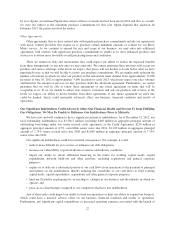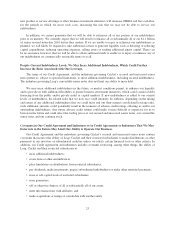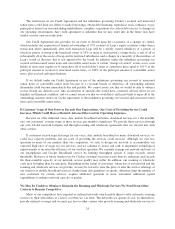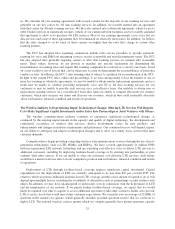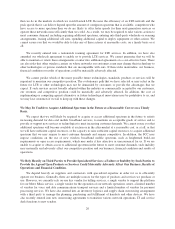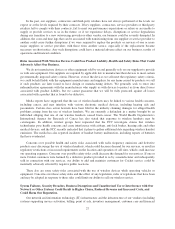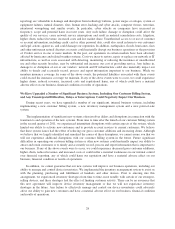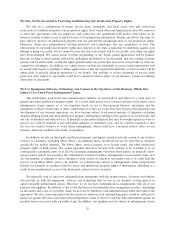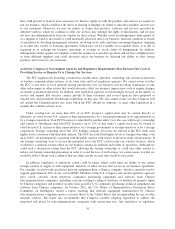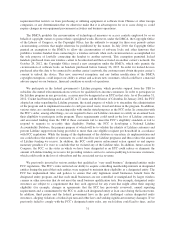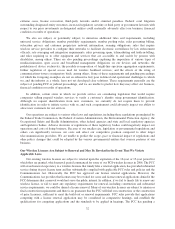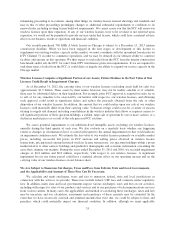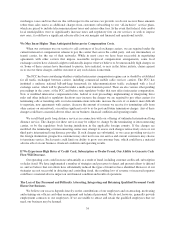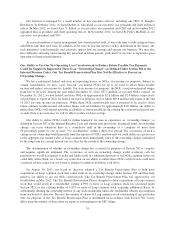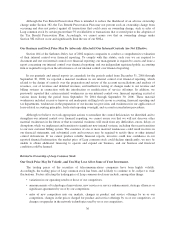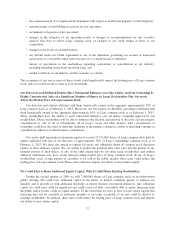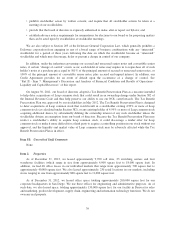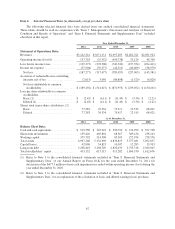Cricket Wireless 2012 Annual Report Download - page 46
Download and view the complete annual report
Please find page 46 of the 2012 Cricket Wireless annual report below. You can navigate through the pages in the report by either clicking on the pages listed below, or by using the keyword search tool below to find specific information within the annual report.extreme cases, license revocation, third-party lawsuits and/or criminal penalties. Federal court litigation
surrounding designated entity structures, increased regulatory scrutiny or third party or government lawsuits with
respect to our prior investments in designated entities could materially adversely affect our business, financial
condition or results of operations.
We also are subject, or potentially subject, to numerous additional rules and requirements, including
universal service obligations; number portability requirements; number pooling rules; rules governing billing,
subscriber privacy and customer proprietary network information; roaming obligations; rules that require
wireless service providers to configure their networks to facilitate electronic surveillance by law enforcement
officials; rate averaging and integration requirements; rules governing spam, telemarketing and truth-in-billing;
and rules requiring us to offer equipment and services that are accessible to and usable by persons with
disabilities, among others. There are also pending proceedings exploring the imposition of various types of
nondiscrimination, open access and broadband management obligations on our devices and networks; the
prohibition of device exclusivity; the possible re-imposition of bright-line spectrum aggregation requirements;
further regulation of special access used for wireless backhaul services; and the effects of the siting of
communications towers on migratory birds, among others. Some of these requirements and pending proceedings
(of which the foregoing examples are not an exhaustive list) pose technical and operational challenges to which
we, and the industry as a whole, have not yet developed clear solutions. These requirements generally are the
subject of pending FCC or judicial proceedings, and we are unable to predict how they may affect our business,
financial condition or results of operations.
In addition, certain states in which we provide service are considering legislation that would require
companies selling prepaid wireless services to verify a customer’s identity using government identification.
Although we request identification from new customers, we currently do not require them to provide
identification in order to initiate service with us, and such a requirement could adversely impact our ability to
attract new customers for our services.
Our operations are subject to various other laws and regulations, including those regulations promulgated by
the Federal Trade Commission, the Federal Aviation Administration, the Environmental Protection Agency, the
Occupational Safety and Health Administration, other federal agencies and state and local regulatory agencies
and legislative bodies. Adverse decisions or regulations of these regulatory bodies could negatively impact our
operations and costs of doing business. Because of our smaller size, legislation or governmental regulations and
orders can significantly increase our costs and affect our competitive position compared to other larger
telecommunications providers. We are unable to predict the scope, pace or financial impact of regulations and
other policy changes that could be adopted by the various governmental entities that oversee portions of our
business.
Our Wireless Licenses Are Subject to Renewal and May Be Revoked in the Event That We Violate
Applicable Laws.
Our existing wireless licenses are subject to renewal upon the expiration of the 10-year or 15-year period for
which they are granted, which renewal period commenced for some of our PCS wireless licenses in 2006. The FCC
will award renewal expectancy to a wireless licensee that timely files a renewal application, has provided substantial
service during its past license term and has substantially complied with applicable FCC rules and policies and the
Communications Act. Historically, the FCC has approved our license renewal applications. However, the
Communications Act provides that licenses may be revoked for cause and license renewal applications denied if the
FCC determines that a renewal would not serve the public interest. In addition, if we fail to timely file to renew any
wireless license, or fail to meet any regulatory requirements for renewal, including construction and substantial
service requirements, we could be denied a license renewal. Many of our wireless licenses are subject to interim or
final construction requirements and there is no guarantee that the FCC will find our construction, or the construction
of prior licensees, sufficient to meet the build-out or renewal requirements. FCC rules provide that applications
competing with a license renewal application may be considered in comparative hearings, and establish the
qualifications for competing applications and the standards to be applied in hearings. The FCC has pending a
32


